|
|
|
Sort Order |
|
|
|
Items / Page
|
|
|
|
|
|
|
| Srl | Item |
| 1 |
ID:
153083
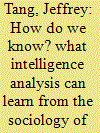

|
|
|
|
|
| Summary/Abstract |
Despite the appeal of correctness batting average as a metric for evaluating analysts, such an approach may be fundamentally misguided. Scholarship in the sociology of scientific knowledge demonstrates the inherent difficulty of determining what ‘actually happened.’ Knowledge in intelligence is socially constructed by practitioners and experts, just as it is in science. Thus, the ‘truth’ about what happened in a particular circumstance is what a group of credential experts say happened. Intelligence studies might benefit from insights gained in science and technology studies to illuminate practices and modes of operation that have thus far gone unexamined.
|
|
|
|
|
|
|
|
|
|
|
|
|
|
|
|
| 2 |
ID:
137210
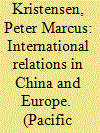

|
|
|
|
|
| Summary/Abstract |
The international relations (IR) discipline is known as an ‘American Social Science’ dominated by scholars and theories from the US core. This paper compares IR in two noncore settings, China and Europe. It shows that there is a growing institutional and intellectual integration into global Anglophone, mostly American, IR in both Europe and China. Both Chinese and European IR communities have established top Anglophone journals like the European Journal of International Relations and the Chinese Journal of International Politics to spearhead their integration into mainstream Anglophone IR and carve out a space for regional thinking. Yet, the analysis of their publication and citation patterns shows that IR outside the American core communicates through a hub-and-spokes system where there is always a connection to the American core but rarely very strong linkages to other peripheral regions. The two journals studied thus function as outlets for ‘local’ and American scholars, rely on ‘local’ and American sources, and there is very little integration and exchange between Chinese and European IR. Chinese and European IR would benefit from such a dialogue, especially regarding ‘schools’ of IR at the margins of an ‘American social science’.
|
|
|
|
|
|
|
|
|
|
|
|
|
|
|
|
| 3 |
ID:
140874
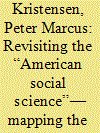

|
|
|
|
|
| Summary/Abstract |
This paper studies the geography of the International Relations (IR) discipline, particularly the notion that IR is an “American social science.” First, it analyzes bibliometric data and finds that US-based scholars continue to dominate IR journals, but also that IR is one of the least US-dominated social sciences and that it has become markedly less so since the 1960s. Second, the paper argues that conventional measures based on nation-state affiliation capture only part of the spatial structures of inequality. It employs novel visualization tools to present an alternative map of elite stratification in IR. Instead of looking at national cores and peripheries, it maps the social network structures of authorship and coauthorship in key IR journals. By mapping city and institutional output, it finds stratification structures within the American discipline. Elite institutions in Northeast America, rather than “America,” dominate the field's leading journals. A similar stratification is found in Western Europe. Moreover, network linkages in terms of both coauthorships and doctoral backgrounds tie these Northeast American and West European elites together. The paper concludes that while US dominance in IR journals is in decline, this has not yet made the discipline as international as its name warrants.
|
|
|
|
|
|
|
|
|
|
|
|
|
|
|
|
| 4 |
ID:
151245
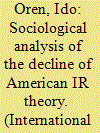

|
|
|
|
|
| Summary/Abstract |
In recent years the centrality of grand, paradigmatic theory in American IR has eroded, with the vacuum being filled by largely atheoretical “hypothesis-testing” research. Although a heated debate has emerged on whether it is good or bad for IR, hardly anyone has tried to analyze this trend. I offer an analysis grounded in a conceptual framework elaborated by sociologist Richard Whitley. In the 1980s and 1990s IR approximated the type of social organization Whitley labeled “polycentric oligarchy”—a hierarchic structure dominated by leaders of competing schools, toward which scholars orient their research. In recent years the field has become more of a “fragmented adhocracy.” Its reputational hierarchy has become more fluid and, concomitantly, its intellectual output has become more fragmented, more empirical, and less oriented toward a theoretical center. To account for this change, I discuss three external forces that reduce American IR's “reputational autonomy”: the corporatization of American higher education; a surge in the availability of research funding from the Pentagon and other defense agencies; and the enduring embeddedness of American IR in the political science discipline. To strengthen my argument, I compare American IR to its Australian counterpart on these three dimensions.
|
|
|
|
|
|
|
|
|
|
|
|
|
|
|
|
| 5 |
ID:
101485
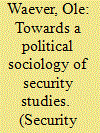

|
|
|
|
|
| Publication |
2010.
|
| Summary/Abstract |
Endowed now with a convincing history of itself, security studies needs a sociological analysis of its workings. The 'post-Kuhnian sociology of science' in the Buzan & Hansen (2009) volume is too sociologically thin and offers a disembodied history of ideas, not a sociology of flesh-and-blood scholars. This article suggests how a sociology of security studies can be strung between the two poles of a sociology of international relations and theories of expertise. Special attention must be paid to the role of 'security theory' for policy analysis, as well as the variation over time and geographically in the institutional chains connecting academe and policy, especially the changing nature of think-tanks. The centre of analysis should be networks of scholars manoeuvring these cross-pressures and making research and other career choices. Through its focus on form, this approach can explain dominant styles of scholarship in the USA and Europe as ways of meeting contrasting demands from academic institutions and policy relevance. The article ends with an assessment of the prospects for security studies.
|
|
|
|
|
|
|
|
|
|
|
|
|
|
|
|
|
|
|
|
|